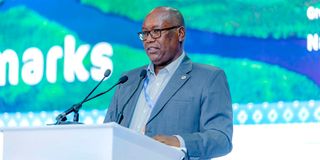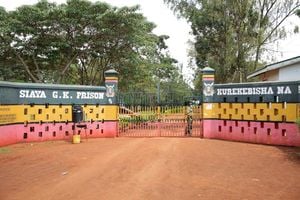Plenty proof: Africa Youth Agenda 2063 within reach and achievable

NMG CEO Stephen Gitagama during Kusi Ideas Festival. The Festival is an initiative of the Nation Media Group and was co-hosted in Partnership with the Government of Botswana.
What you need to know:
- NMG Group Chief Executive Officer, Joseph Gitagama, calls on young Africans to take up active roles in the political arena in order to actualise the Youth Agenda 2063.
- Botswana President Mokgweetsi Masisi stated that Africa had what it takes to emerge as the world’s economic powerhouse through determination.
The fifth edition of the Nation Media Group Kusi Ideas Festival came to a close on Friday in Gaborone, Botswana, with experts and leaders calling for concerted efforts to enlighten the African youth to take an active role in generation of ideas to be patented, as well as leadership in policy and decision making.
The high-level conference was graced by various dignitaries including Botswana President Mokgweetsi Masisi, Zimbabwe President Emmerson Mnangagwa, Rwanda and Tanzania Deputy Presidents Edouard Ngirente, and Doto Biteko, respectively, among others.
In his closing remarks, NMG Group Chief Executive Officer, Joseph Gitagama, called upon young Africans to take up active roles in the political arena in order to actualise the Youth Agenda 2063.
“You need to be on the decision making table. The top positions are made up of very old, people who do not understand you, or your language. You need to take active roles in politics and grab those leadership positions so that you can influence policy making,” said Mr Gitagama.
He opined that actualisation of Agenda 2063 would require individual and collective responsibility in realising the desired continent.
Referring to the past 20 years of Africa as a ‘story of contradiction, the NMG Editor-in-Chief Joe Ageyo, said despite Africa making huge strides with the largest growing middle class and the fastest growing economies, according to Word Bank, it still faces many challenges such as armed conflict and poor health systems.
President Masisi stated that Africa had what it takes to emerge as the world’s economic powerhouse through determination.
On his part, Zimbambwe’s head of State, President Mnangagwa, reiterated the need for a united Africa.
Earlier on, panellists tackled the place of the African youth in getting their ideas patented, the challenges in that process, and whether or not they knew their rights in that space.
Unemployed youth
Innocent Havyarimana, a Burundi national who lives and operates in Kenya, recounted how he made up his mind to start Glap Enterprises in 2015, after he knocked on countless doors searching for a job to no avail.
Being a refugee, job hunting in a country with thousands of other unemployed youth, only made matters bleaker for him.
Not being one to easily throw in the towel, a relentless Innocent decided to start his own company and has never looked back since.
He is presently the proud employer of 43 individuals most of them refugees (27) and 16 Kenyans, through his company, Glap Enterprises, which manufactures 16 brands of soap.
“I started this company because, I looked for a job in vain. I applied to many companies, sent numerous applications to institutions including government parastatals without success,” Innocent recounted.
“I asked myself why, using my education background, do I not create something that will not only benefit me, my family and everyone else?”
Innocent’s dream is to extend beyond Kenyan borders and provide employment to hundreds of more youths in Africa and beyond, he told the last day of Kusi Ideas Festival, where he was among the panellists.
Kusi Ideas Festival, which was launched by the Nation Media Group in 2019, was held in Gaborone, Botswana, this year, in the wake of spirited efforts by African nations to achieve sustainable development and economic growth.
In order to realise these goals the continent has embarked on an ambitious blueprint for the Youth Agenda 2063.

NMG Editor-in-Chief, Joe Ageyo, moderates Kusi Ideas Festival panel in Gaborone, Botswana on December 8, 2023.
Innocent exemplifies the endless potential wielded by youths and entreprenuers in realising Agenda 2063 and making Africa the innovation hub it is supposed to be.
This can only be achieved when young people shift focus from the government and corporates and implement their innovative ideas.
“Entrepreneurs, let us go outside there and do it. Let us execute those ideas. We need we need to change that mindset of chasing after government and corporates... If you start doing it they will come running after you,” he states.
According to the entrepreneur, there is a need for Africans to write their own success stories through inventions by trying multiple times. He cited Amazon which took nine years to break-even and Uber which took 11 years despite pouring in billions of dollars.
“We need to be comfortable with failure, be okay with embracing failure, that is something that our leaders really struggle with.”
He faulted the political landscape and discriminatory policies that make it impossible for local budding innovators and entrepreneurs to thrive or even compete with foreign inventors.
“Governance either enables or blocks progress. We cannot compete with them because it is all about market capture. They think in centuries, capture the money and make profit in the long-run. In our systems/economies we think from one election to the next one. What can one make in the next five, eight or 10 years depending on the country you are in? It becomes difficult to start thinking in the future.”
Although young people aged below 25 years make up a huge segment of the African population at 60 percent, Martin Stimela, Brastorne CEO and Co-founder holds that the same is not reflected in government positions, Cabinet or institutions.
“Policies are being made for people who are not in the room. Spend time with youths to determine where they are and what are they doing.”
Grassroots innovations
“We apply such stringent standards that are discriminatory to local entrepreneurs. This makes it easy for foreigners to come and apply the same technology here. We need to rethink how we treat standards and how we celebrate our own.”
Mary Nyaruai , Nyungu Africa CEO reiterates that the 2063 goals can only be achieved through implementation and partnerships between the private and public stakeholders.
“For the dreams of Africa to come true, we have to come together through public and private partnerships. We have to be very deliberate at policy level. Africa is very good at policy making, the problem comes in implementation. Policy is implementation and implementation is policy,” she states. She opines that there is need for complete overhaul of the education sector in Africa saying the present system curtails innovation .
“We need to revolutionise how we teach our children. We should teach them to creative thinkers from a tender age,”
“Most young people do not have jobs and the majority who are not included, live in rural areas where there are so many grassroots innovations. We need to identify those innovations and see how we can scale them up for practical solutions which can be applied.”
“Young people go to school complete and pursue PhDs just to enrich publications yet we do not have research commercialisation programs in our universities to help with actual innovations that can be scaled up. How then is government working with universities to identify these innovations?”
According to the International Financial Corporation (IFC), Africa contributes 2 percent of the world research, 1.3 percent research expenditure and a partly 0.1 percent of all patents. There are 230 million jobs which will require digital skills by 2030 with about 700 innovation hubs compared to 314 hubs in 2016, according to the IFC.
Lack of knowledge on how to write patents is another key obstacle facing African youths.
“Intellectual property is a source of income for most companies. Are we helping entrepreneurs to secure open-source technology that can be replicated by several people? How are we teaching people to register for patents?”





